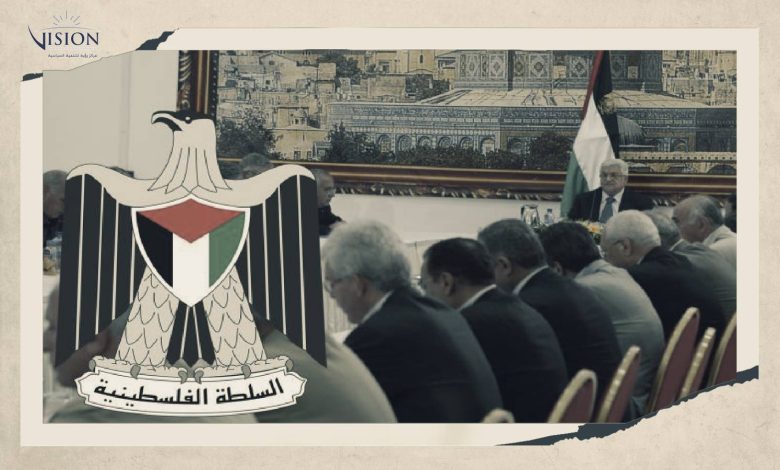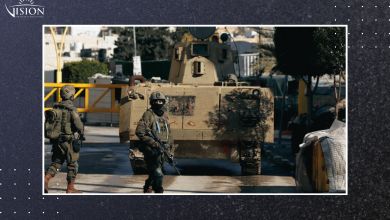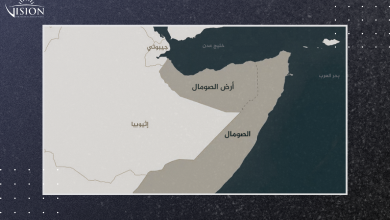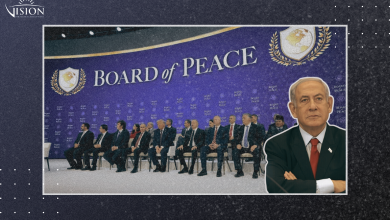What if Collapse Occurs? Scenarios Post the Palestinian Authority

Vision Center for Political Development
Prepared by: Mohammed Hassan Darkhalil
Contributing Experts: Dr. Ahmed Atawna, Dr. As’ad Ghanem, Jihad Harb, Dr. Hassan Obeid, Dr. Sami Al-Arian, Areeb Al-Rantawi, Dr. Amr Darrag, Dr. Mohsen Saleh.
Many prevailing political indicators come together, pointing to the potential continuation of the Israeli-Palestinian conflict, but within a framework where the Palestinian Authority is missing. The Authority has sequentially been losing the factors of its survival under the aggravation of substantial challenges confronting it, such as the closing off of the political horizon and Oslo reaching a dead-end. This strengthens the likelihood of the Palestinians and the world one day awakening, possibly soon, to a new political landscape where the collapse of the Palestinian Authority is proclaimed.
Today, the Palestinian Authority faces the most extreme Israeli government, and the one most convinced of the necessity to strip the Palestinians of any sovereign political entity on the lands that Israel considers within its geographical boundaries. Indeed, this government is diligently working to erase any chances for the establishment of a Palestinian state. Following Netanyahu’s success in forming his government, it has commenced announcing settlement plans that include the construction of thousands of settlement units, and the “legalization” of some settlements from which withdrawal occurred after the Al-Aqsa Intifada in 2000 CE. Additionally, Netanyahu’s government has imposed economic sanctions on the Palestinian Authority, under the pretext of the latter disbursing salaries to Palestinian prisoners and martyrs.
This comes accompanied by Israeli arrogance and encroachment into the territories of the Palestinian Authority, and the perpetration of massacres against the Palestinians, such as the recent massacre in January 2023 in the Jenin camp, which claimed the lives of nine Palestinian martyrs. There was also an invasion of the same camp in July 2023, which resulted in the martyrdom of approximately ten Palestinian citizens, along with the destruction of the infrastructure and many houses within the camp.
The Palestinian Authority stands helpless in the face of this Israeli extremism, unable to confront it at any level, even politically and legally. The Authority has not managed to pursue any case on the international stage, despite possessing all the elements necessary for the success of certain issues in international courts. A state of confusion and ambiguity also dominates Fatah, as a faction controlling the Authority, regarding the succession of President Abbas, pointing to a lack of clarity concerning internal fissures, and uncertainty about the future of inheritance. This is in view of the intensification of competition between equal contenders, along with the absence of a Fatah personality possessing the attributes of inheritance without competition, as Abu Mazen inherited from Yasser Arafat in 2005.
Not only that, but Fatah today experiences a gap between its official leadership and its base, from which emerge armed resisters contradicting the movement’s official directions. The Authority’s security apparatus also appears today to have lost control over the security situation in some of its areas, such as the concentration of militants in the Jenin camp, and the old town in Nablus.
The hypothetical dissolution of the Palestinian Authority embodies a substantial challenge, necessitating judicious and meticulous contemplation of conceivable scenarios. In the event of the departure of Palestinian President Mahmoud Abbas, or a structural breakdown within the Palestinian Authority, there arises an immediate imperative to delineate and systematize the essential mechanisms required to safeguard the perpetuation of Palestinian political and governmental existence, in a manner conducive to the realization of the Palestinian national aspiration. This demands that Palestinian leadership, in conjunction with the populace at large, undertake preparations for a transitional phase subsequent to President Abbas, or following the Palestinian Authority’s potential disintegration, by investigating feasible avenues to extract the most favorable outcome conceivable.
The continuance of the Authority may endure in various manifestations for an extended duration or may succumb to collapse precipitously. This predicament is contingent on the possibilities accessible to Netanyahu and his ensuing resolutions, inciting an inquiry into:
- The ramifications of a collapse of the Palestinian Authority, and the inclination towards which novel political paradigm? What would characterize the ensuing landscape?
- What apprehensions reside with each stakeholder? What constitutes their vested interests? How shall the disparate factions maneuver? What are the subsequent implications?
- How plausible is the promulgation of novel occupation stratagems, such as forced migration? What shall be the position of Gaza? And under whose governance, and what civilian alternatives must the Palestinians (relative to various factions) submit?
These inquiries unveil the intricate and multifarious nature of the prevailing situation, demanding an astute approach and comprehensive scrutiny of an array of variables, both intrinsic and extrinsic, to the Palestinian political milieu.
In order to address these queries, the Vision Center convened a political simulation session with the objective of prognosticating the prospective phase. Understanding the positions of concerned Arab nations, such as Jordan and Egypt, as well as other states like the United States, which stands as the principal supporter of Israeli policies, is essential in the context of a scenario that impacts the equilibrium of the Palestinian arena.
This political simulation embodies a sincere attempt to explore and analyze the future of the Palestinian Authority and comprehend the potential ramifications of its collapse at political, social, and regional levels. Through this simulation, the Vision Center aspires to furnish a platform for constructive dialogue and the exchange of opinions and recommendations among experts and specialists in this domain. The intention is to hone future insights and proffer a comprehensive and cognizant perspective on the future of the Palestinian cause.
This approach reflects an emphasis on rigorous analysis, strategic planning, and a synthesis of expert viewpoints, all aimed at fostering a nuanced understanding of a complex and evolving situation. It underscores the critical importance of multifaceted thinking and collaborative discussion in shaping policy and planning for future contingencies in the Palestinian context.
Positions of Influential Parties: Based on the Opinions of Experts Participating in this Simulation
Fatah Movement
Historically, the Fatah Movement has embraced a dual identity in its struggle for the establishment of a Palestinian state, an identity that synthesizes reliance on diplomatic channels with armed revolutionary activism. Despite its inclination towards the diplomatic sphere in accordance with the logic of realpolitik, this does not negate the deeply entrenched idea of armed action among a substantial base of the movement’s members. The Fatah Movement was founded as a revolutionary entity aiming at the liberation of Palestine, and the pursuit of self-determination through direct revolutionary action.
The leadership options within the Fatah Movement do not encompass the concept of dissolving the Palestinian Authority, as the movement perceives it as an initial step toward achieving an independent Palestinian state. Should the Palestinian Authority collapse as a result of internal divisions, popular protests, or a decision by the Israeli occupation, the movement will not abandon the political gains it has achieved over past decades. The movement’s diplomatic emphasis in previous decades does not render impossible the reinvigoration of its choice for armed resistance once more.
This assessment underscores the intricate balance that Fatah has historically maintained between diplomacy and armed resistance, reflecting a nuanced strategy that has evolved in response to changing political landscapes. The potential future scenarios mentioned highlight the complexity of the movement’s stance and the careful considerations that are likely being weighed by its leadership, indicating the multifaceted nature of political decision-making within the context of the Palestinian struggle.
In the event of the collapse of the Palestinian Authority for any reason, the movement’s leadership will endeavor to remain in the existing control and power centers, including security. There will also be a focus on retaining the civil services and the officials appointed by the movement, and preserving the maximum possible influence and elements. This will be a priority for its leadership, with a keenness to avoid repeating the Gaza scenario, regardless of the incoming party. In addition, the movement will strive to maintain large corporations, such as telecommunications companies, with the aim of keeping the economy in the best possible condition.
If the reason for the collapse of the authority is the Israeli occupation, there may be a trend among the Fatah movement’s elite to reshape military forces, thereby reviving its military wing. What increases the likelihood of this is the possibility of forming greater convictions among sectors like the youth that armed resistance is the only option for the Palestinian people, and thus cooperating with the rest of the Palestinian factions. Accompanying the re-adoption of the armed option will be a serious endeavor to cling to all political and institutional gains.
As for the scenario of the collapse of the authority due to popular protests, it will be unlikely, as this will be efficiently obstructed by the Fatah movement and security apparatuses.
Hamas Movement
Hamas, as a pivotal actor in the Palestinian political landscape, adopts a distinct perspective on political direction and action in the event of the collapse of the Palestinian Authority. Its behavior, even though it may show pragmatism in some matters, will be more closely linked to the political ideology advocating resistance and ending occupation. It will adopt a conception of managing civil and service life, benefitting from its governance experience, in a way that the service and life dimensions do not detach from the resisting political aspect.
It is probable that the movement will not seek to fill the political and institutional vacuum left by the collapse of the authority in the West Bank, as much as focus on the necessity of resistance as the optimal method for confronting the occupation and achieving Palestinian aspirations. This focus comes especially after the failure of political settlement experiences such as Oslo. What increases the likelihood of the movement’s avoidance of filling the vacuum is its rejection of the international conditions, which essentially form the basis for Israeli acceptance.
In this context, Hamas will attempt to persuade the Fatah movement and other Palestinian factions to rally around Gaza as a center for comprehensive national resistance against the Israeli occupation. It will also adopt an economic vision where a resistance economy replaces a welfare economy, in addition to promoting a departure from the consumer culture that supports the Israeli economy, and striving for economic independence to enhance the chances of resistance in imposing its demands and goals. Furthermore, the movement will work on activating popular frameworks at various levels to contribute to filling the void resulting from the collapse of the authority.
The Arab Republic of Egypt
Egypt is engaged in maintaining its role as a central political actor in the Middle East, particularly within the Israeli-Palestinian dossier, aligning with the American approach to the conflict. Considering the intricate interplay between its diplomatic initiatives and strategic interests, Egyptian foreign policy aims to preserve political stability in the West Bank as an urgent necessity to safeguard those interests, especially the role it historically played as a mediator in the Israeli-Palestinian conflict, and the role it currently assumes in the negotiations between the Palestinian resistance and the occupation.
In its approach to the conflict, Egypt sets forth from a dual strategy, characterized by maintaining peace with Israel, concurrently with its ability to influence the Palestinian cause and its related issues. By this, Egypt endeavors to strike a balance between enhancing its diplomatic ties and safeguarding its national security.
Amid talks of the potential collapse of the Palestinian Authority, Egypt may find itself enmeshed in an unstable political process, especially if the situation deteriorates to the brink of chaos, or if a popular uprising erupts in the wake of the collapse.
It would be a matter of concern for Cairo if the Palestinian resistance in the West Bank grows in the event of the authority’s collapse, posing a threat to its national security. Should this occur, Cairo will follow two parallel paths: it will work to fortify its relationship with the Hamas movement, seeing in it a guarantee for the continuity of its influence in the Palestinian file, thereby earning regional and international approval. Simultaneously, it will endeavor to revive the political settlement in collaboration with the elite of the Fatah movement
The Hashemite Kingdom of Jordan
Jordan faces multifaceted and significant challenges in the light of the current political reality. Its role is expected to be greatly affected if the Palestinian Authority collapses. Jordan, like Egypt, is a key player in the peace process, and the collapse of the authority could deprive it of an essential strategic role on one hand, and may pose an internal threat on the other, considering the demographic reality Jordan is experiencing.
Jordan endeavors to avoid any scenario that leads it into a square of instability, drawing lessons from past experiences, especially events such as Black September in 1970, and the rise of political Islam following the Arab Spring wave, as another example. Consequently, Jordanian political behavior will be influenced by the extent of the ruling elite’s concern over igniting a spark of rebellion by the Jordanian Islamic forces, especially if the Islamists regain their political and institutional role in the West Bank. Jordan will confront any state of chaos with high severity and may resort to measures such as closing the bridges, as it has previously closed the borders with Iraq and Syria to prevent undesirable influx
Should the Palestinian Authority collapse, Jordan will strive to prevent its impact on the internal Jordanian situation, especially among Jordanians of Palestinian origin. In the midst of its priorities, it will also work on finding administrative solutions under its leadership, should the Palestinian leadership prove incapable of instating authority—a move that may be welcomed internationally. Nevertheless, Jordan may feel apprehensive about this administrative option, as it could contribute to the penetration of the Palestinian resistance into the Jordanian milieu.
Jordan will lean towards engaging with other Palestinian sectors, aiming to deal more proficiently with the changes, even after the decline in the status and influence of the Fatah movement.
Israel
In the complex dynamics of the Palestinian-Israeli conflict, the Palestinian Authority, with its current performance and scope, represents a comfortable entity that contributes to achieving Israeli interests and stability. The continuation of the Authority in its current form also constitutes a first line of defense against the ongoing Palestinian resistance. Any disintegration or collapse of the Authority may lead to a state of tension, with the possibility of escalating protests and resistance activities in the West Bank and the Gaza Strip, which Israel is keen to avoid.
From a strategic perspective, Israel may move towards adopting a new model of power-sharing that includes Israel, Jordan, and Egypt, if the Fatah movement decides to withdraw or events lead to the collapse of the Palestinian Authority. Facilitating this model is the potential engagement and support of regional parties, such as Saudi Arabia, the United Arab Emirates, and Qatar, as a means to enhance stability in the region.
Furthermore, Israel might lean towards supporting the idea of establishing an alternative authority led by prominent figures in the Fatah movement, seeking through it to preserve the current situation, with modifications to the administrative structure of the Authority, such as dividing the West Bank into cantons, possibly under the supervision of international security forces. It is worth mentioning that reproducing the administrative form of the Palestinian Authority presents an opportunity for the Israelis to tighten their grip on Palestinian lands and allow the expansion of settlement activities therein.
The United States of America
Regional powers like Jordan and Egypt often find themselves in alignment with the boundaries of policies designed by the United States, generally aimed at maintaining regional stability and preserving peace. This enhances Washington’s influence in shaping the regional dynamics affecting various files, including the Palestinian file.
Given its cautious policy, characterized by not allowing matters to deteriorate to the point of chaos, the United States works to prevent chaos as a possible option in the Palestinian situation, given its concern about the demographic change taking place, represented by the increase in the youth sector within Palestinian society, and the difficulty in predicting and controlling its choices, especially concerning the potential orientation towards resistance.
Consequently, Washington will adopt a stance that prevents the complete dissolution of the Palestinian Authority unless a consensus emerges in the Israeli position towards its dismantling. This highlights the interaction of dynamics of powers that may exert pressure on the American approach towards the disintegration of the Authority.
At the same time, the United States will not leave room for elections in which the chances of Palestinian resistance are high, and will attach great importance to enhancing political stability, by preventing the economic collapse of the Palestinian Authority.
Expected Scenarios:
First: The Scenario of Chaos and Internal Conflict: It is anticipated that the Palestinian factions will strive to competitively fill the void, increasing the likelihood of strife among different parties or even entering a civil war, especially between the competing currents within the Fatah movement.
Contributing factors to this scenario:
- The lack of a clear and agreed-upon vision among the Palestinian factions.
- Factionalism and internal division and the possibility of conflict between Fatah and Hamas.
- The crisis of competition among the leading personalities within the Fatah movement.
- Israel’s exploitation of the state of chaos to pass its settlement policies.
At the same time, a set of factors may prevent this scenario, including:
- International and regional intervention to prevent such a scenario.
- The possibility of a state of Palestinian internal solidarity, especially if the Fatah movement re-adopts the idea of armed struggle.
- The emergence of societal and elite pressure campaigns that may be more influential than the community’s dealing with the existing division.
- Israel’s refusal to allow a state of complete chaos and collapse.
Second: Scenario of the Return of Direct Israeli Rule:
In addition to Israeli influence and continuous, intense intervention even in the presence of the Palestinian Authority, this may not prevent the reestablishment of direct Israeli governance over the West Bank, akin to the civil administration prior to the arrival of the Palestinian Authority.
Factors contributing to the emergence of this scenario:
- Israel’s Priority in Maintaining Security: Even in the presence of the Palestinian security forces and the continuation of security coordination, Israel has not reduced its level of action and security measures in the areas under the Authority’s control. Should the role of the Authority’s security end, it will be replaced by Israeli security agencies, especially in light of Israeli distrust in delegating full security responsibility in the West Bank to any other party.
- Participation in the Development of Infrastructure under Occupation: This may lead to Palestinian acceptance.
- Economic Integration: Israelis may benefit from the Palestinian market.
- A Tendency of Palestinian Segments to Prefer Direct Israeli Rule over the Palestinian Authority: Due to failure in managing Palestinian affairs on multiple levels.
Factors that may hinder this scenario:
- Palestinian Resistance: Direct Israeli rule would face Palestinian resistance, potentially joined by Fatah in a military form.
- International Pressure: Israel may face a challenge related to the legitimacy of its control over the West Bank and its reoccupation, with opposition from the United Nations.
- New Responsibilities and Burdens: Israel would face a significant responsibility related to the civil and political rights of the Palestinians.
- Demographic Challenge: The increase in the number of Palestinians represents an administrative challenge on one hand, and a strategic one related to the political future of the Palestinians in the West Bank on the other.
- Israeli Opposition: There may be internal Israeli opposition rejecting a return to direct rule over the West Bank after having relinquished it since the Oslo Accords.
Third: Scenario of Maintaining the Current Status under a Limited Authority:
This entails that the current conditions remain largely unchanged, but within a process where local forces, such as municipalities, clans, and certain community organizations, play a more substantial role. This is through resources and channels other than those possessed by the Authority today, while keeping the latter within very limited jurisdictions. This scenario is considered the most likely.
Factors contributing to the realization of this scenario:
- Enhancement of Local Governance: The possibility of amplifying the role of local governance, taking up a significant part of the Palestinian Authority’s function.
- International Community’s Interest and Priority: The international community’s interest in finding an alternative to the Authority may push towards maintaining the Authority but with fewer powers.
- Increase and Strengthening of Community Organizations’ Role: This may take over roles from the Palestinian Authority, especially given their extensive service experience and significant service role for many years prior to the Palestinian Authority’s inception.
- Competition within Fatah Elites: This might contribute to some of its leadership accepting more limited formats for the Authority’s role, in exchange for continuing its influence.
- Loss of Authority Over Time: The gradual erosion of the Authority’s powers.
- Loss of the Palestinian Authority’s Control over Gaza: The exposure of all Authority-controlled areas to Israeli incursions.
- Division of the West Bank into Cantons: This facilitates the separation of areas from one another.
- Financial Crisis Facing the Palestinian Authority: A suffocating financial crisis, coupled with a noticeable reduction in external support.
This scenario paints a picture where current dynamics may remain, but with subtle shifts in power and influence within local and international contexts. It emphasizes the potential for a multi-dimensional approach involving various societal actors and international stakeholders, acknowledging the complex challenges and limited powers of the Palestinian Authority.
Factors that May Hinder this Scenario:
- Economic Collapse: The economic collapse may lead to the difficulty of re-establishing a new Authority or rehabilitating the current one.
- Instability and Internal Conflict: The chances of this option may decrease in the case of instability and internal strife.
- Increased Israeli Control: The collapse of the Authority may allow greater Israeli control and intervention, leading to difficulties in convincing the Palestinians of a new type of Authority under increased Israeli control.
- Spread of Armed Groups: Armed groups may proliferate in the West Bank, exploiting the state of void, and preventing the chances of establishing a new Authority.
- Reduced Confidence of International Parties: The collapse of the Authority may diminish the international parties’ confidence in the Palestinians’ ability to govern, considering the political, security, and geographical reality that the West Bank is experiencing.
Note: The conclusions and opinions expressed in this report do not necessarily reflect a consensus or the views of the participating experts.





